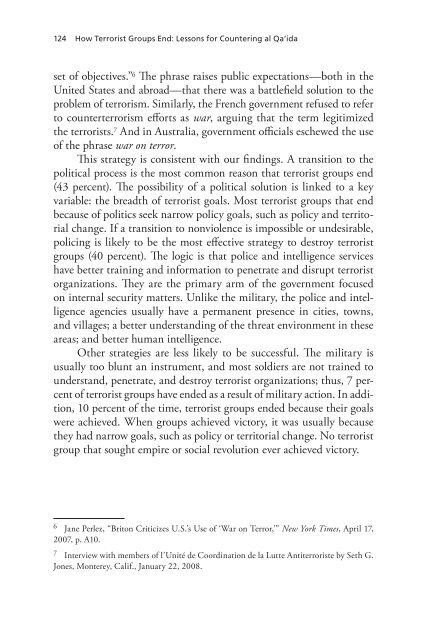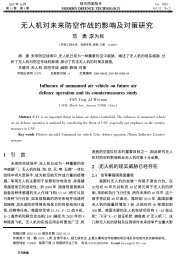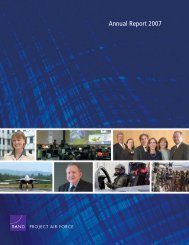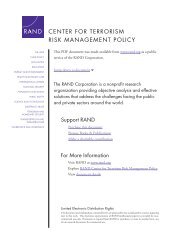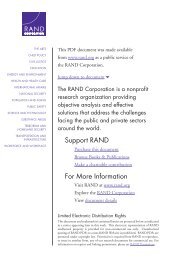How Terrorist Groups End - RAND Corporation
How Terrorist Groups End - RAND Corporation
How Terrorist Groups End - RAND Corporation
You also want an ePaper? Increase the reach of your titles
YUMPU automatically turns print PDFs into web optimized ePapers that Google loves.
124 <strong>How</strong> <strong>Terrorist</strong> <strong>Groups</strong> <strong>End</strong>: Lessons for Countering al Qa’ida<br />
set of objectives.” 6 The phrase raises public expectations—both in the<br />
United States and abroad—that there was a battlefield solution to the<br />
problem of terrorism. Similarly, the French government refused to refer<br />
to counterterrorism efforts as war, arguing that the term legitimized<br />
the terrorists. 7 And in Australia, government officials eschewed the use<br />
of the phrase war on terror.<br />
This strategy is consistent with our findings. A transition to the<br />
political process is the most common reason that terrorist groups end<br />
(43 percent). The possibility of a political solution is linked to a key<br />
variable: the breadth of terrorist goals. Most terrorist groups that end<br />
because of politics seek narrow policy goals, such as policy and territorial<br />
change. If a transition to nonviolence is impossible or undesirable,<br />
policing is likely to be the most effective strategy to destroy terrorist<br />
groups (40 percent). The logic is that police and intelligence services<br />
have better training and information to penetrate and disrupt terrorist<br />
organizations. They are the primary arm of the government focused<br />
on internal security matters. Unlike the military, the police and intelligence<br />
agencies usually have a permanent presence in cities, towns,<br />
and villages; a better understanding of the threat environment in these<br />
areas; and better human intelligence.<br />
Other strategies are less likely to be successful. The military is<br />
usually too blunt an instrument, and most soldiers are not trained to<br />
understand, penetrate, and destroy terrorist organizations; thus, 7 percent<br />
of terrorist groups have ended as a result of military action. In addition,<br />
10 percent of the time, terrorist groups ended because their goals<br />
were achieved. When groups achieved victory, it was usually because<br />
they had narrow goals, such as policy or territorial change. No terrorist<br />
group that sought empire or social revolution ever achieved victory.<br />
6 Jane Perlez, “Briton Criticizes U.S.’s Use of ‘War on Terror,’” New York Times, April 17,<br />
2007, p. A10.<br />
7 Interview with members of l’Unité de Coordination de la Lutte Antiterroriste by Seth G.<br />
Jones, Monterey, Calif., January 22, 2008.


